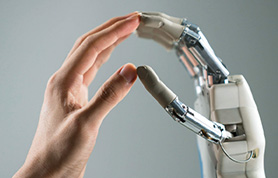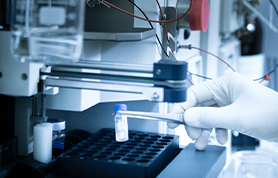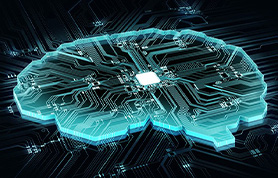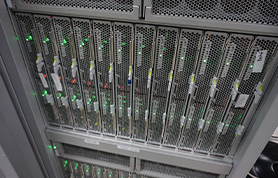EDUCATION
Department
-

Graduate School of Artificial Intelligence
The aim of the Graduate school of Artificial Intelligence (AI) at UNIST is to help students gain in-depth knowledge as well as hands-on experience of AI via its unique learning opportunities aligned with key AI challenges. To achieve this goal, this school offers a student-led customized AI education program with three concentrations: AI theories, AI systems, and AI applications. The AI theories part focuses on addressing the core challenges of AI such as data efficient AI, reliable AI, and Aartificial General Intelligence; the AI systems part help develop skills essential for making efficient hardware and software systems for next-generation AI applications; and the AI applications part explores applications of AI with possibilities for making real-world Impact in areas such as manufacturing, mobility, and healthcare.
-

Graduate School of Health Science and Technology
UNIST Global HST Program, a cutting-edge initiative designed for aspiring physician-scientists, focusing on the convergence of disciplines to cultivate a new breed of medical researchers. Tailored for outstanding individuals in the STEM fields, this program delivers intensive interdisciplinary medical education aimed at nurturing physicians with a deep understanding of research. The program’s unique approach involves seamless collaboration between the UNIST, medical schools, and hospitals to foster the development of innovative and cyclical physician-scientists. Through dynamic partnerships with innovation hubs and medical institutions, the program aims to create a synergy that propels groundbreaking advancements in bio-medical technologies.
-

Department of Electrical Engineering
Electrical engineering (EE) is a field of engineering that deals with everything from developing solid-state devices and designing integrated circuits to developing information theory, Artificial Intelligence, and control and communication systems. EE is leading challenging, creative, and innovative researches based on the versatility to make our daily life rich and convenient. Therefore, it focuses on research and development of IT convergence systems which are capable of enriching the future life of human being to be pleasant, secured, convenient, and socially connected. A broad range of IT technologies in the EE areas is to be proactively merged together to create new benefits with the advent of Internet-of-Things, Artificial Intelligence driven by digital convergence. The world renowned faculty members of EE are actively studying extensive IT technologies towards hyper-connected society and beyond the 4th industrial revolution.
-

Department of Computer Science and Engineering
The field of computer science and engineering deals with the theories and technologies that are changing our lives. From deep learning, revolutionizing computing to networks that connect everyone and everything, and to big data and cloud computing that provide the infrastructure to support the anticipated changes of the future. Department of Computer Science and Engineering is involved in cutting- edge developments happening now and into the future. Our world renowned faculty members who have experience in leading universities and companies are here to guide you through the myriad of technological knowledge in this field.
-

Department of Biomedical Engineering
The Department of Biomedical Engineering (BME) focuses on solving biomedical problems that must be addressed to make our society healthier with science and technology. In particular, students will become creative and skilled leaders in futuristic healthcare by learning and integrating six key research areas of UNIST BME (precision nanomedicine, genomics & bioinformatics, rehabilitation & regenerative engineering, biomedical imaging, brain & cognitive engineering, digital healthcare), with our world-class interdisciplinary research and education programs.
-

Department of Biological Sciences
Ground-breaking research achievements in biological sciences such as the genome editing, stem cell research, innovative therapies in cancers, and age-related diseases highlight the potential of biological sciences to be one of the most promising areas in science. The department of Biological Sciences aims to produce brilliant and creative scientific minds that are familiar with the principles of biology and the biological cutting- edge techniques available at the state-of-the-art facilities provided by UNIST. Researches in the Department of Biological Sciences at UNIST are focused on age-related diseases, neuroscience, stem cells and regenerative medicine.
-

Department of Design
Situated within one of Korea’s prestigious national institutes of science and technology, the Department of Design at UNIST creates future- focused design outcomes – products, interfaces, services, and systems. We nurture professionals in both traditional and emerging design fields. While acquiring fundamental design knowledge and skills in intensive courses, our students learn to tackle real-world problems and conduct rigorous academic research through collaborative lab projects and personal thesis. Our partners include small and large companies, public-sector organizations, and research : https://design.unist.ac.kr/
-

Department of Industrial Engineering
Under the vision of ‘data science-based problem solving’, the Department of Industrial Engineering (IE) at UNIST aims to cultivate highly skilled data scientists who can solve the decision-making problems faced by companies, industries, and society through engineering technologies. We research and teach the state-of-the-art methodologies related to optimization, artificial intelligence, data mining, process and systems engineering, and financial engineering to help decision making based on real-world data. Our department fosters the development of convergent talents with theoretical and practical knowledge for the 4th Industrial Revolution era, who will lead the nation’s industry and economy with problem solving abilities and leaderships based on the scientific accuracy and the engineering efficiency.
